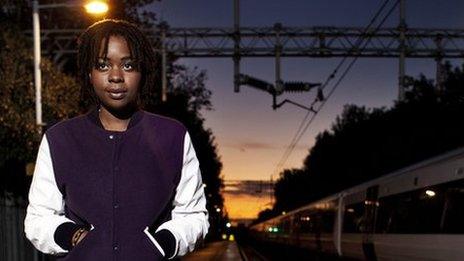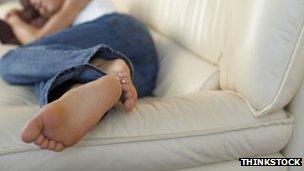Speech Debelle: My homeless years
- Published

Many people equate homelessness with sleeping rough, but life is also a struggle for those who have to live on friends' sofas or in hostels, writes rapper Speech Debelle.
Most teenagers go through a rebellious phase. I suffered the consequences of mine for nearly four years.
I got into trouble at school and the more trouble I got into, the more rocky things got between me and my mum. My dad wasn't around much, so it was solely down to her to cope with my unruly behaviour.
By the time I was 19, things got pretty bad. We stopped being able to communicate and a relationship which previously was that of best friends broke down. One day I just said: "I'm out, I'm done."
I had nowhere stable to go, but I was angry and rebellious enough to not think about the consequences. My mum probably thought that a dose of reality was just what I needed at that point, so she said: "Fine, go then. See how you fare out there in the big wide world."
Yet, throughout my time away, she was still there for me. She would buy me groceries if I was stuck and helped me out financially now and again. It would have been much more difficult without her help, as it is for so many others.
Initially when I left home, I stayed on the sofa at a friend's house. Things were okay there for a while but I wasn't happy. When you're on someone's sofa, your friendship with that person becomes unbalanced. No matter how close you are, it's their personal space, the situation creates pressure and although I left home in part to feel more like an adult, I felt more like a child then ever.
My self esteem took a knock and I started feeling more and more uncomfortable - I was "sofa-surfing".
Looking back, I really didn't have a clue where all this was leading. I felt rootless, lost and depressed. I didn't have anywhere I wanted to go, nor anywhere I wanted to be.
When sofa-surfing became impossible, I called Shelter to find out if I could get a room somewhere.
speech rapping
They placed me that day in a women-only hostel in Victoria. Some of my friends who had left home were staying in hostels, so it seemed like a means to an end.
At the time, there was a lot more social housing available, and for them living in a hostel was the best way to find permanent accommodation. But by the time I got into a hostel, social housing was becoming much harder to come by.

"Sofa-surfing" can be a short-term option for some homeless people
It was a relief to have my own space, but far from satisfying. Everything felt stagnant and stale, even the water from the taps. But it was in that hostel that I did find another form of escape that proved to be most fruitful.
I started writing rhymes again, something I hadn't done in many years. I remember one night I couldn't sleep. I was sitting in my room, hungry. I went downstairs to look for something to eat, but all I had was butter.
I went back up to my room to contemplate where I was, no money, no credit on my phone, and I started writing the song Searching:
"2am in my hostel bed, my eyes them red, my belly ain't fed / I got butter but I ain't got bread and I'm smoking on my last cigarette / I ain't got creds I can't make calls / Got no papers I got no jewels / Got debts up to my eyeballs / Christmas soon come and I got no funds but what's Christmas if you ain't at Mum's?"
I started recording with my crew First Love Musik any time I could. I'd tried using the time to study but being on Jobseeker's Allowance meant I could only do a one evening a week. One evening a week for three years feels like it's going nowhere. After a couple of months, I lost interest and was doing what I could to get by.
Eventually I had to leave the room in Victoria and started moving from hostel to hostel. There was one day I remember, in another women-only hostel, when I started to re-think my situation.
Space was becoming scarce. I was seeing a lot of women who had been beaten or abused, some of them with small children, and I remember thinking I don't need this space like they do.
I also began to realise that I was stuck. Before being in a hostel I had tons of energy and was ready to take on the world. I started a record label when I was 17 and finding myself trapped in a room not growing or working was too much to deal with. So eventually, after nearly four years, I went home.
I realise now how lucky I was to have a home to go back to. It put things into perspective for me and made me value the relationship with my mother in a new way. I had my best friend again. I'd met so many people for whom that wasn't the case.
Things are much harder now. There's less space in the hostels, waiting lists are far longer, rents and deposits are higher, and housing benefit cuts mean that if you're on DSS finding a place has become harder than ever.
For some young people, the risk of sleeping rough is the grim reality they face every day, and for some, committing crime or being admitted to hospital become real options.
Britain's Hidden Homeless shows only the tip of the iceberg. The people I met were contactable, they agreed to be filmed despite their problems, and they were actively seeking a way forward.
There are so many more who we couldn't get hold of, or were ashamed of where they found themselves, or who had tried to escape through drink and drugs.
Homelessness is increasing quickly, help is hard to find and too many vulnerable young people in this country are beginning their adult lives thinking about day-to-day survival rather than their own futures.
Not having a stable home has a damaging effect on your health, self-esteem, your confidence, and your ability just to get on your own two feet and make something of your life.
I came across a lot of lost potential in these young people and that's very sad - both for them and society generally.
The song that I wrote in that hostel in Victoria became part of my debut album that won me the Mercury Music Prize and started my career.
I wonder if I hadn't had a hostel place and a home to go back to, how different my life would have been? How many other potential young artists, nurses, engineers, scientists or teachers are out there being held back by the housing crisis?